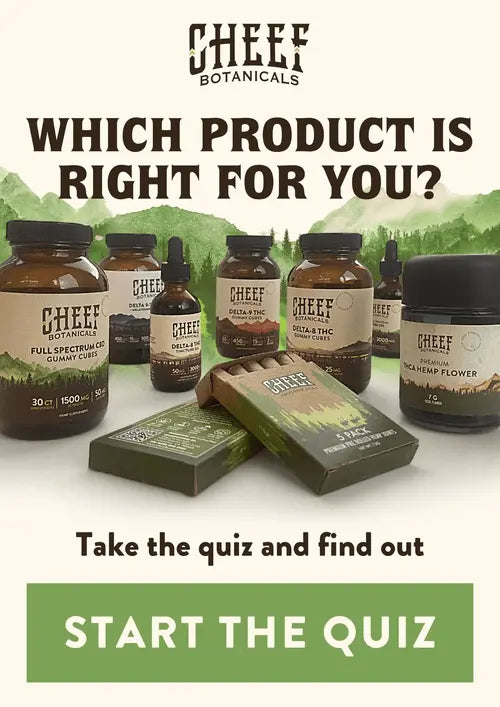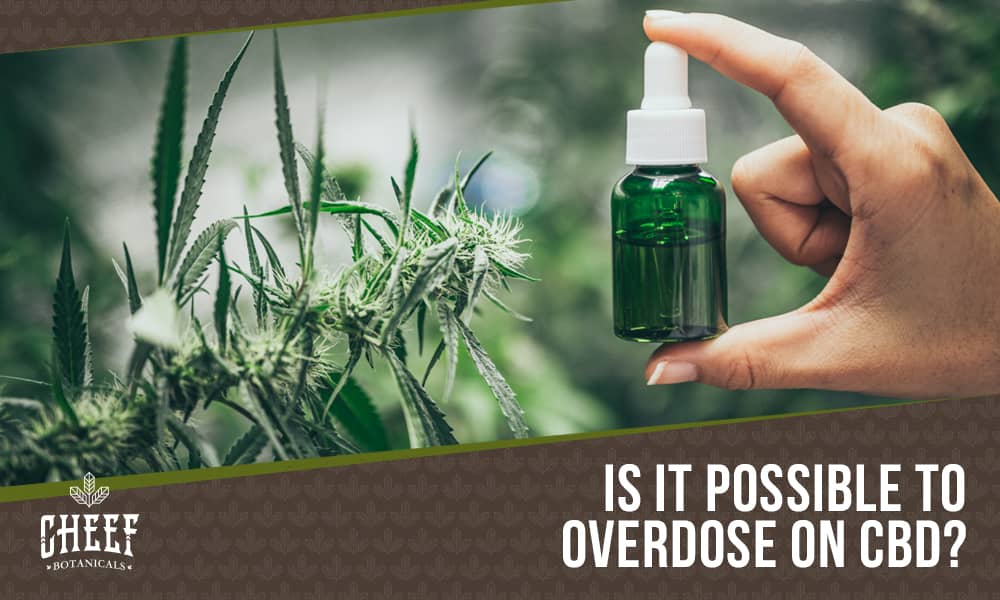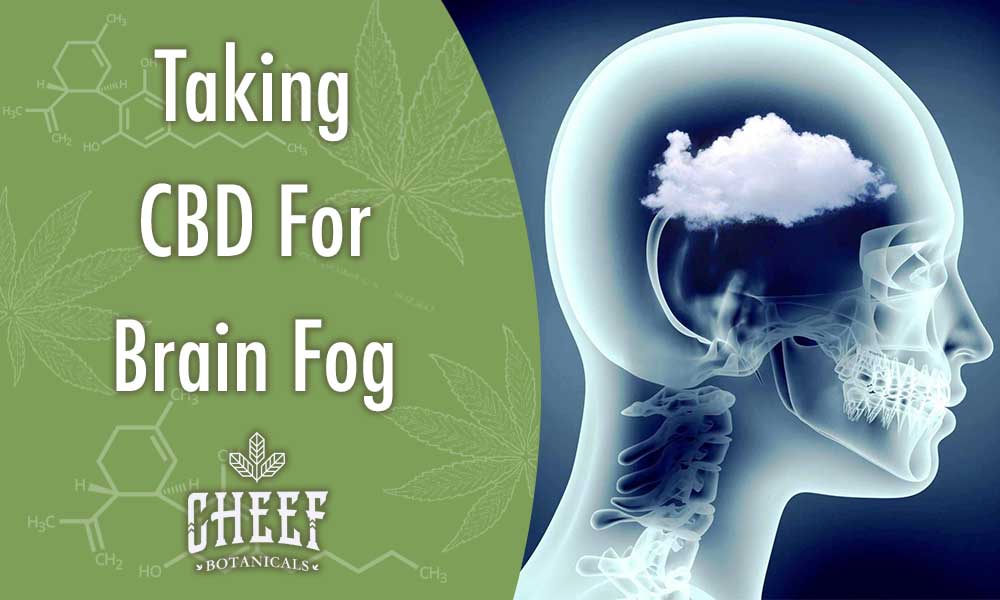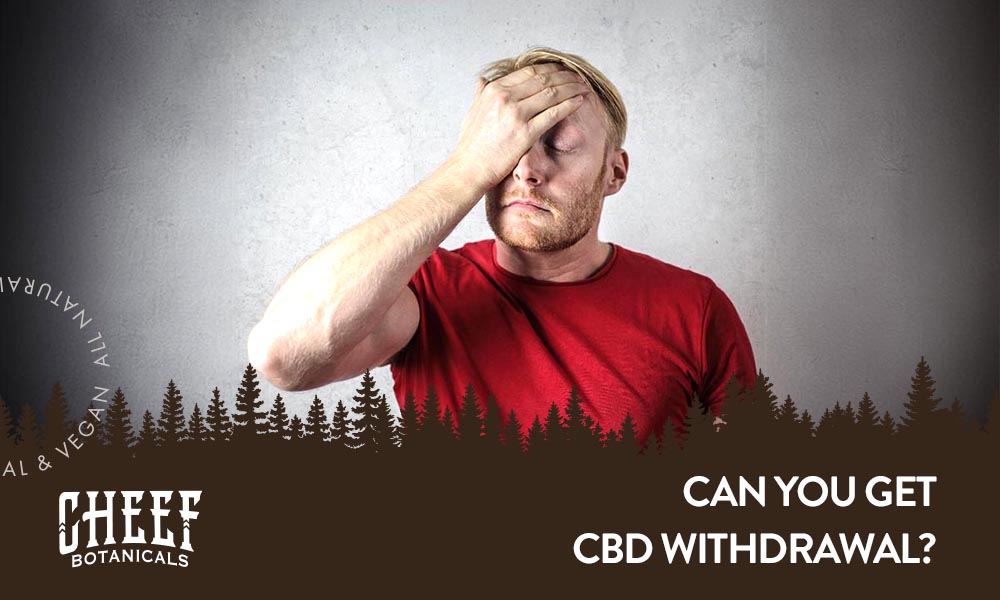CBD can soothe any discomfort you're feeling. It can make you feel relaxed and make stress fade away. CBD has a lot of benefits for your mind, body, and overall well-being. It can sometimes seem too good to be true as you continue to take CBD throughout the week. So can you overdose on CBD?
The short answer here is: No!
It takes a LOT of CBD to reach a "toxic dose." And we mean a lot. We'll tell you just how much CBD you have to ingest in this article to be considered an "overdose." And even if you did take too much CBD, the side effects are not dangerous at all.
So let's dive right in and find out more about how to properly take CBD oil and how you'll be able to tell if you've taken too much.
Is CBD Oil Addictive?
Okay, okay. First, let's go over what CBD is so it's easier to explain why CBD is NOT addictive. So CBD is a non-psychoactive phytocannabinoid found in hemp. Unlike THC, another phytocannabinoid, CBD does not get people high. That means it doesn't have a lot of the same addiction-related effects.
There are hundreds of phytocannabinoid compounds in hemp, along with terpenes and flavonoids — those are what give CBD products their taste and scent. When you combine all of these components together in full-spectrum CBD oil, you create the "entourage effect" thanks to the crazy synergy they create. Basically, it makes the benefits stronger. And you still don't feel "high" or experience any of those negative side effects.
The World Health Organization (WHO) said in 2017 that CBD is "not associated with abuse potential." That was from a study with "well-controlled human experimental research." A study from the previous year also found that a small group of adults experienced physical and psychological effects from THC (like rapid heart rate, increased blood pressure, decreased cognitive function) but not from CBD.
So, CBD is not considered addictive at all. There are even studies, in fact, that support claims that CBD can treat drug addiction. A 2015 study found evidence that CBD can treat nicotine and cannabis addiction.
In short, CBD is not addictive and has no addictive properties while still providing impactful benefits to your health and well-being.
Can You Build a Tolerance to CBD Oil?
We have more good news for you: You most likely won't build a tolerance to CBD!
Building a tolerance to things we enjoy (sugar, coffee, marijuana, etc.) is quite common. Something that once had a major effect on you won't have that same power when you've eaten it or taken it many times thereafter in most cases. So it makes sense to think that CBD is just another substance you'll end up building a tolerance to the more you take it.

There are three types of tolerance. There is cellular tolerance, where cells become less responsive to a compound, metabolic tolerance, where less of the substance reaches the target area, and behavioral tolerance, which is when we become psychologically attuned to the effects of a substance. Some tolerances can also be a combination of two of these types — or even all three.
Each person's tolerance is also different since we all have a different genetic structure and physiology. For some people, it can take weeks to develop a tolerance to a certain substance, while it can take even longer for others.
CBD Can Create Reverse Tolerance
When it comes to THC, the cannabinoid receptors in our body's endocannabinoid system become less interested in binding with the compound over time. Sometimes the receptors will even hide from the THC by retreating inside a cell to avoid bonding with the THC!
With CBD, however, it's actually the complete opposite. In fact, it's sometimes called reverse tolerance. Instead of directly binding with CB1 and CB2 receptors like THC does, CBD encourages the production of endocannabinoids (the stuff that helps us maintain our balance and well-being).
By doing so, our bodies actually need less of a substance to feel the same effects. Instead of our ECS becoming overactive from compounds like THC, CBD manages the ECS' receptor activation. This simply means that frequent CBD use can often mean we need less to feel the same benefits over time!
Can You Overdose on CBD?
Are you ready for MORE good news?
So, the "toxic dose" of CBD is 20,000 mg — which is a crazy amount. For example, a lot of CBD gummies are only 100 mg. That means you'd have to eat 2,000 CBD gummies. An entire bottle of CBD oil is often 300 mg total, meaning you'd have to down over 66 bottles.
But even if you were able to manage 2,000 CBD gummies, the amount of CBD wouldn't be lethal. But you would probably experience a major sugar rush so it's highly recommended that you DON'T eat that many CBD gummies.
The National Cancer Institute weighed in on the matter as well. The organization stated that cannabinoid receptors aren't found in the brain stem so there's no way CBD could change key functions like breathing. Opioids are located in the brainstem, which is why they can interrupt things like blood circulation and breathing. While there are side effects of taking a bunch of CBD at once, it won't be lethal.
Related Post: Can You Get CBD Withdrawal?How to Tell if You've Taken Too Much CBD
While you can't realistically overdose on CBD, it's still possible to take too much CBD. You won't die and it's not considered dangerous. Taken in extremely large doses, CBD has some side effects you should be aware of:
- Dry mouth
- Change in appetite
- Extreme drowsiness
- Feeling lethargic
- Upset stomach
- Nausea
- Diarrhea
- Feeling a bit dizzy
So yeah, it's not like you want to feel lethargic and queasy. But you won't risk your health or overdose. Still, you should always take an amount of CBD that feels best for your own individual body and needs. We'll guide you a bit below.
How Much CBD Oil Should You Take?
When it comes to taking CBD oil, everyone has their own unique threshold and requirements. But the general recommendation is 0.25 mg of CBD per 1 pound of body weight for a regular dose and 0.5 mg of CBD per every 1 pound of body weight for a stronger dose.
Here's some examples:
- 120 pounds: 30 mg of CBD / 60 mg of CBD
- 140 pounds: 35 mg of CBD / 70 mg of CBD
- 160 pounds: 40 mg of CBD / 80 mg of CBD
- 180 pounds: 45 mg of CBD / 90 mg of CBD
- 200 pounds: 50 mg of CBD / 100 mg of CBD
- 220 pounds: 55 mg of CBD / 110 mg of CBD
- 240 pounds: 60 mg of CBD / 120 mg of CBD
You get the idea! Well, if you know basic math. I personally need a calculator for this stuff. But overall, it's luckily an easy concept to grasp with straightforward answers.
Always start lower than the regular dose if you've never used CBD oil before. See how it affects you. You can always take more next time if you need to.
A regular dose is often used for daily health and wellness, promoting immune function, helping minor skin irritations, giving you relief if you feel nervous, and helping with minor discomforts and soreness. For the most effective benefits, take this amount every eight hours or as needed.
Take a look at our CBD dosage chart if you want more information about general dosing suggestions and guidelines.

Best Way to Take CBD Oil
The best way to take CBD oil is orally. CBD oil drops can be placed under the tongue, known as sublingual. Let your chosen dosage of CBD sit under your tongue for 30 seconds. If any liquid is left, use your tongue to rub the CBD oil against your cheeks and the top of your mouth.
Taking CBD sublingually is one of the fastest ways to feel the effects of this phytocannabinoid. You'll feel the benefits within five minutes! That's because there are mucous membranes under your tongue that absorb the CBD into your bloodstream.
Another great way to use CBD oil is by vaporizing. Vaping has become quite popular recently because it offers the highest rate of bioavailability. This means that you will feel the effects of CBD the fastest in comparison to other CBD products on the market. You'll often feel the effects in under one minute due to the permeable membranes in your lungs that allow the vaporized CBD to be absorbed into the bloodstream.
CBD can also be ingested, either by baking with CBD oil, eating edibles, or swallowing capsules. This way takes a bit longer to take effect, depending on your weight, metabolic rate, and even if you recently ate food. The range is usually 30 minutes to one full hour — that's the average length for the CBD to be broken down by your gastrointestinal system.
While it takes longer to take effect than other methods, ingesting CBD can often be the most enjoyable way to experience CBD. CBD oil can be used in a lot of fun recipes, from alcoholic beverages and sports drinks to pancakes, brownies, and stir fry. CBD gummies are another deliciousand fun way to ingest CBD oil.
CBD oil can also be applied topically. While applying CBD oil directly to the skin often doesn't impactful benefits, there are topical products that include CBD oil. This includes lotions, salves, and balms. The additional ingredients in these CBD products moisturize the skin and provide relief for the discomfort you're experiencing in a localized part of your body in a matter of minutes.
Final Thoughts
Full-spectrum CBD oil is effective because all of the cannabinoids, flavonoids, and terpenes in hemp synergize to create the "entourage effect." With only 0.3% THC at most, you won't get high at all. Instead, the CBD will positively impact your mind and body by interacting with your endocannabinoid system, as explained earlier.
Even though CBD provides a lot of benefits, you don't want to buy CBD oil from just anywhere. You want to make sure that the CBD within is of high quality. While there have been zero known cases of people overdosing on CBD, the market is still pretty unregulated. So you want to find a place that's trustworthy.



 CBD Gummies - Top Seller
CBD Gummies - Top Seller
 CBD + THC Gummy - Excellent Choice
CBD + THC Gummy - Excellent Choice
 CBD Hemp Flower - Highly Rated
CBD Hemp Flower - Highly Rated
 Full Spectrum CBD Oil - Good Value
Full Spectrum CBD Oil - Good Value



Leave a comment
This site is protected by hCaptcha and the hCaptcha Privacy Policy and Terms of Service apply.